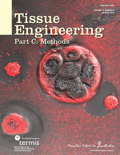
Tissue Engineering Part C-Methods
metrics 2024
Pioneering Innovative Approaches in Bioengineering
Introduction
Tissue Engineering Part C: Methods is a prestigious academic journal published by MARY ANN LIEBERT, INC, specializing in the dynamic and rapidly evolving fields of bioengineering and biomedical engineering. With an ISSN of 1937-3384 and E-ISSN 1937-3392, this journal provides a platform for the dissemination of cutting-edge research from 2008 to 2024, showcasing methodologies that advance the science of tissue engineering. Ranked in the second and third quartiles across several categories in 2023, including a notable Q2 in Biomedical Engineering, the journal is recognized for its contributions to the interface of biology and engineering. Additionally, it holds commendable Scopus ranks that highlight its influence and reach within the scientific community. Although it does not offer open access, the journal remains vital for researchers, professionals, and students seeking insightful articles that bridge the gap between theoretical research and practical application in tissues and regenerative medicine. With its rigorous peer-review process and commitment to quality, Tissue Engineering Part C: Methods continues to be an essential resource for those at the forefront of tissue engineering innovations.
Metrics 2024
 0.60
0.60 2.70
2.70 3.40
3.40 88
88Metrics History
Rank 2024
Scopus
IF (Web Of Science)
JCI (Web Of Science)
Quartile History
Similar Journals
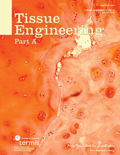
Tissue Engineering Part A
Innovating the Future of Regenerative MedicineTissue Engineering Part A is a prestigious peer-reviewed journal published by MARY ANN LIEBERT, INC that focuses on innovative research and advancements within the field of tissue engineering and regenerative medicine. Since its inception in 2008, this journal has played a critical role in disseminating cutting-edge findings that bridge the gap between laboratory research and clinical application, underscoring its significance in the scientific community. With a diverse scope encompassing biochemistry, bioengineering, biomaterials, and biomedical engineering, the journal ranks notably in the Scopus database, holding a Q2 quartile status across multiple categories, thus reflecting its high impact on ongoing research and professional practice. For researchers, professionals, and students, Tissue Engineering Part A serves as an invaluable resource, offering insights into the latest methodologies and breakthroughs that drive the future of healthcare and therapeutic strategies. While primarily a subscription-based journal, it ensures that vital research is accessible to a broad audience of scientists and engineers committed to advancing the life sciences.

Cell Regeneration
Empowering Breakthroughs in Cellular DevelopmentCell Regeneration, published by SPRINGERNATURE, stands at the forefront of biological research, focusing on the dynamic field of cellular development and regenerative biology. Since its establishment in 2012, this journal has embraced an Open Access model, facilitating widespread dissemination of key findings and fostering collaboration among researchers in the Netherlands and beyond. With an impact factor underscoring its significance, Cell Regeneration is positioned in the Q2 category in both Cell Biology and Developmental Biology as of 2023, ranked #32 out of 82 and #170 out of 285 in relevant Scopus peer fields. The journal encompasses a broad spectrum of research that advances our understanding of cellular processes, offering vital insights into regenerative mechanisms and their applications in therapies. This robust platform not only serves as a valuable resource for researchers, professionals, and students but also encourages scholarly dialogue and innovation in the fast-evolving landscape of cell biology.
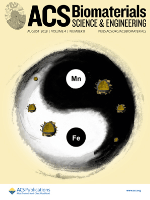
ACS Biomaterials Science & Engineering
Elevating Biomaterials Science to New HeightsACS Biomaterials Science & Engineering, published by the American Chemical Society, serves as a premier platform for the latest advancements and research in the fields of biomaterials and biomedical engineering. With an impressive impact factor and a strong reputation reflected in its ranking—Q2 in Biomaterials and Q1 in Biomedical Engineering—the journal attracts a diverse and engaged readership. Since its inception in 2015, it has aimed to foster innovation by publishing high-quality research articles, reviews, and perspectives on the synthesis, characterization, and application of biomaterials. Researchers and professionals benefit from the journal's rigorous peer-review process and its focus on translational science, making it essential for those looking to stay at the forefront of biomaterials research. Located in Washington, DC, USA, the journal plays a pivotal role in connecting academic and industrial sectors, ultimately driving advancements that impact biomedicine and related fields.

Regenerative Biomaterials
Bridging Science and Application in BiomaterialsRegenerative Biomaterials, published by Oxford University Press, serves as a premier platform for the dissemination of innovative research in the rapidly evolving field of biomaterials. Since its inception in 2014, this esteemed open-access journal has fostered a collaborative and diverse scientific community, providing free access to impactful articles that enhance our understanding of regenerative medicine and tissue engineering. With a commendable impact factor and ranking within the top quartiles of both Biomedical Engineering and Materials Science, it is recognized for its rigorous peer-review process and high-quality publications. The journal aims to bridge the gap between fundamental research and applied sciences, promoting advanced studies that contribute to clinical applications and regeneration strategies. Researchers, practitioners, and students alike are encouraged to engage with the journal’s content to foster interdisciplinary collaboration and drive future innovations in the biomaterials domain.

Current Stem Cell Research & Therapy
Elevating the Science of Stem Cells for Better HealthCurrent Stem Cell Research & Therapy, published by Bentham Science Publishers Ltd, is a leading journal dedicated to advancing the field of stem cell research. With an ISSN of 1574-888X and an E-ISSN of 2212-3946, this journal has been a valuable resource since its inception in 2006 and continues to broaden its scope through 2024. Recognized in the Q2 quartile for Medicine (miscellaneous) and ranked in the 66th percentile among its peers, the journal plays a crucial role in disseminating high-quality, peer-reviewed research that explores both the therapeutic and biological implications of stem cells. Located in the United Arab Emirates, Current Stem Cell Research & Therapy embraces a global audience of researchers, professionals, and students, providing a vibrant platform for discourse and innovation. While the journal offers subscription-based access, it remains committed to enhancing the scientific community's understanding of stem cell therapy and its applications across various medical fields.

Materials Today Bio
Empowering researchers with open access to vital scientific advancements.Materials Today Bio, published by Elsevier, is an esteemed open-access journal dedicated to advancing the fields of bioengineering, biomaterials, and biomedical engineering. Since its inception in 2019, this journal has quickly made a name for itself, currently ranked Q1 in multiple categories including Bioengineering, Biomaterials, and Biotechnology, reflecting its exceptional quality and relevance in the rapidly evolving landscape of bio-related sciences. With an impressive Scopus ranking positioning it in the top 25% of its categories, Materials Today Bio provides a vital platform for researchers and professionals to share cutting-edge discoveries and innovative applications that bridge the gap between materials science and biological studies. Accessible to a global audience, this journal not only fosters collaboration among the scientific community but also aims to highlight significant advancements in cell and molecular biology, making it an indispensable resource for students and seasoned experts alike. The journal's commitment to open access since 2019 underscores its dedication to disseminating knowledge widely, ensuring that crucial findings reach those who can benefit from them the most.
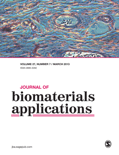
JOURNAL OF BIOMATERIALS APPLICATIONS
Leading the charge in biomaterials applications and methodologies.JOURNAL OF BIOMATERIALS APPLICATIONS, published by SAGE PUBLICATIONS LTD, serves as a pivotal platform for the dissemination of cutting-edge research in the field of biomaterials and biomedical engineering. With an ISSN of 0885-3282 and an E-ISSN of 1530-8022, this journal has been a respected venue for scholarly communication since its inception in 1986. Aiming to provide comprehensive insights into the applications of biomaterials, this journal publishes high-quality articles that explore innovative materials and methodologies, thereby fostering advancements in medical technology and tissue engineering. The journal consistently ranks in the third quartile (Q3) for both Biomaterials and Biomedical Engineering categories, strengthening its position among the noteworthy academic resources available today. With a dedicated readership comprising researchers, industry professionals, and students, JOURNAL OF BIOMATERIALS APPLICATIONS plays a vital role in supporting knowledge exchange and scientific progress within these dynamic fields.
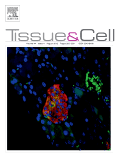
TISSUE & CELL
Bridging Basic Research and Clinical ApplicationsTISSUE & CELL is a prominent academic journal, published by CHURCHILL LIVINGSTONE, that has been at the forefront of research in the fields of cell biology, developmental biology, and miscellaneous areas of medicine since its inception in 1969. With a strong focus on high-quality research, TISSUE & CELL has established itself within the academic community, holding a Q3 ranking in both Cell Biology and Developmental Biology, and a Q2 ranking in Medicine as of 2023. The journal aims to disseminate significant findings that contribute to the understanding of tissue structure and function, helping to bridge the gap between basic biological research and clinical applications. While it operates on a subscription basis and does not currently offer Open Access options, the journal remains a vital resource for researchers, professionals, and students interested in cutting-edge developments in the biological sciences. The journal's address is located in the scenic city of Edinburgh, further establishing its academic heritage in the United Kingdom.
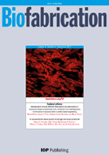
Biofabrication
Shaping Tomorrow's Biomedical Technologies Today.Biofabrication, published by IOP Publishing Ltd, stands at the forefront of the interdisciplinary fields of biochemistry, bioengineering, biomaterials, biomedical engineering, biotechnology, and miscellaneous medicine. Since its inception in 2009, this prestigious journal has secured its position within the Q1 category across multiple disciplines as of 2023, reflecting its high impact and significant contribution to advancing research in these domains. With ranks such as #19 in biochemistry and #10 in biomaterials according to Scopus, it showcases groundbreaking studies and innovative methodologies that are crucial for the evolution of biofabrication technologies. Authored by leading researchers and professionals, the journal publishes articles that explore the synthesis, characterization, and application of biomaterials, providing valuable insights for both academic researchers and industry practitioners. The impact factor of the journal, combined with its rigorous peer-review process, guarantees high-quality content that pushes the boundaries of knowledge and technology. Researchers and students engaged in these dynamic fields will find Biofabrication an indispensable resource for staying abreast of critical developments and emerging trends.

Annual Review of Biomedical Engineering
Pioneering Discoveries for a Healthier TomorrowAnnual Review of Biomedical Engineering, published by Annual Reviews, stands as a leading academic journal dedicated to the rapidly evolving field of biomedical engineering. With an impressive impact factor that reflects its high citation rates and rigorous peer-review process, this journal offers critical insights by synthesizing cutting-edge advancements and applications in both biomedical engineering and miscellaneous medicine. The journal, which is available in both print (ISSN: 1523-9829) and electronic formats (E-ISSN: 1545-4274), serves as an essential resource for researchers, professionals, and students aiming to stay abreast of significant developments and emerging trends. As of 2023, it is recognized in the top tier (Q1) for both Biomedical Engineering and Medicine, showcasing its esteemed position within the academic community, reflected in its high Scopus rankings. Spanning from 1999 to 2024, the Annual Review of Biomedical Engineering continues to catalyze interdisciplinary collaboration and innovation at the intersection of engineering and healthcare.